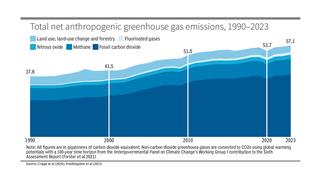Recently a Gurugram-based carbon removal company, Varaha Climate AG Pvt Ltd, said it had issued carbon credits based on its biochar project. This marked the first ever issuance of industrial biochar credits in India.
Converting biomass into biochar is doubly beneficial — it solves a disposal problem and generates income. Madhur Jain, co-founder and CEO, explains that if corn shank, a biomass, is burned, it results in carbon dioxide emissions; if left in the open, it decomposes into methane. Either way, it is a problem.
But if converted into biochar in a gasifier, you get not only energy for processing corn seeds but also char — which farmers can use as soil nutrient. Importantly, char is carbon — it remains in the soil.
Varaha’s project in Telangana produces biochar from agricultural waste (corn shanks).
Through its diversified portfolio of science-backed carbon removal credits, it has positioned itself as a leading solution provider for global companies targeting net-zero goals.
How does it work?
Jain explains that biochar boosts the water-holding capacity of agricultural fields and cuts the use of chemical fertilizers, saving costs.
“The facility receives corn cobs from farmers and processes them to produce corn seeds,” he says.
The fuel needed for this process can be produced via the gasification of waste biomass. “We created an infrastructure with one of the seed companies, which allowed us to use this energy to dry incoming corn cobs and generate biochar, which is given back to the farmers — creating a circular economy.”
The carbon credits for sequestering carbon into biochar is based on puro.earth standards for engineered carbon removal which, according to Jain, “has the most stringent norms”.
The credits were sold to Artemeter, a carbon investment manager.
Acidic soils
Varaha has several projects beyond carbon removal. For instance, its ‘rock weathering’ project reduces soil acidity. Here, basalt rock powder is sprayed onto agricultural fields that are more acidic.
Besides Telangana, Varaha is currently present in Gujarat, Rajasthan and Madhya Pradesh. The company has enrolled over 9 lakh acres of farmland across India, Bangladesh, Nepal and Kenya, working with over 100 partners in these geographies.






Comments
Comments have to be in English, and in full sentences. They cannot be abusive or personal. Please abide by our community guidelines for posting your comments.
We have migrated to a new commenting platform. If you are already a registered user of TheHindu Businessline and logged in, you may continue to engage with our articles. If you do not have an account please register and login to post comments. Users can access their older comments by logging into their accounts on Vuukle.